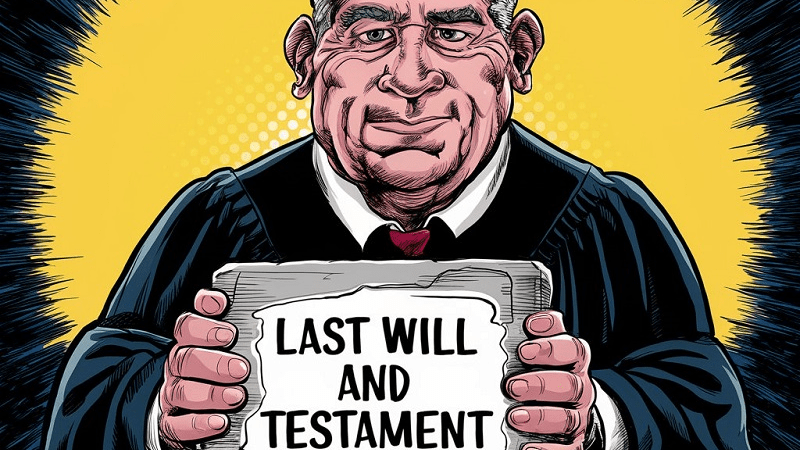Occasionally, I receive phone calls from individuals who are dealing with problems with the executor of the loved one’s estate. Sometimes the executor is refusing to divide the deceased’s personal possessions fairly; sometimes the executor is refusing to communicate with the individual or to share information about the deceased’s estate; and sometimes, in a worst case scenario, the executor is blatantly refusing to follow the deceased’s last will and testament. Often, the individual informs me that she hadn’t yet called an attorney because the executor had told her that if she did so she would be “contesting the will” and the executor would make sure she receives nothing from the estate. “Is that true?” she asks. “Can he really cut me out of the will?”

What is a No Contest Provision?
First, it is important to know that Nevada law does allow a testator (a person who creates a will) to include a “no contest” provision in the person’s will. Specifically, the law states that the testator may make a gift in a will “conditional … upon the occurrence or nonoccurrence of one or more specified events.” NRS 133.065(1). In other words, the testator can require that if the beneficiary ever claims that the will is invalid for some reason (i.e., “contests” the will) then that beneficiary would lose any gift given to the beneficiary in the will. In fact, Nevada law specifically states that “a no-contest clause in a will must be enforced by the court.” NRS 137.005(1).
Unfortunately, uninformed and sometimes malicious executors too often use the “no contest” provision in the will improperly as a way to scare beneficiaries into not raising valid questions regarding the executor’s handling of the estate. Such scare tactics may be employed by uninformed executors who feel that they are “just doing what dad told me to do before he died,” even though it wasn’t written into the will. In worst case scenarios, these scare tactics are used to cover the executor’s tracks of wrongdoing and sometimes actual theft of estate assets.
How to Raise Concerns
Fortunately, Nevada law protects beneficiaries who have legitimate concerns about what is happening with their loved one’s estate and allows the beneficiaries to raise legitimate concerns without being considered to be “contesting the will”.
First, a beneficiary will not be considered to be contesting the will if the beneficiary “seeks only to enforce the terms of the will.” NRS 137.005(3)(a). For instance, if the will states that a beneficiary is supposed to receive dad’s car, but the executor insists that dad told him to give the car to the beneficiary’s sister, the beneficiary can bring an action in court to ask the court to enforce the gift of the car to the beneficiary.
Second, a beneficiary will not be considered to be contesting the will if the beneficiary “seeks only to enforce the [beneficiary’s] legal rights in the probate proceeding.” NRS 137.005(3)(b). A common problem in probate proceedings is an executor that refuses to provide a required inventory or accounting of the estate’s assets to the beneficiaries. If a beneficiary files an action in court asking the court to require the executor to report and account for the assets of the estate, the beneficiary is not contesting the will by asking for the accounting that the beneficiary is legally entitled to receive.
Third, a beneficiary will not be considered to be contesting the will if the beneficiary “seeks only to obtain a court ruling with respect to the construction or legal effect of the will.” NRS 137.005(3)(c). Sometimes there are provisions in a will that simply are not clear because the will was poorly written. A beneficiary is entitled to ask the court to interpret the will and determine what the will means without being at risk of having contested the will.
Fourth, and most importantly, Nevada law protects beneficiaries even if the beneficiary actually does file a court action asking the court to invalidate a will if the action is filed in “good faith” and with “probable cause that would have led a reasonable person, properly informed and advised, to conclude that the will is invalid.” NRS 137.005(4).

The Nevada Supreme Court protected a beneficiary from a no-contest clause even though the beneficiary asked the court to invalidate a will because the beneficiary had a good faith belief and probable cause to believe that the testator was legally incompetent at the time that the will was signed. The Supreme Court refused to enforce the will’s no contest clause even though the beneficiary lost his challenge of the validity of the will when the court determined that the testator actually did have proper mental capacity to sign the will. Hannam v. Brown, 956 P.2d 794, 114 Nev. 350 (1998).
Do not be Intimidated
If you are a beneficiary of a will and the executor (or anyone else) has told you that you are contesting the will and you are going to lose your inheritance if you continue, the best thing you can do is speak with an experienced probate attorney. The worst thing you can do is to give in to these improper scare tactics by not consulting an attorney. More often than not, you will be protected in seeking to enforce your rights under the will and under Nevada law while it is the executor that faces serious problems with the court for employing these scare tactics to hide improper and sometimes illegal actions by the executor.
